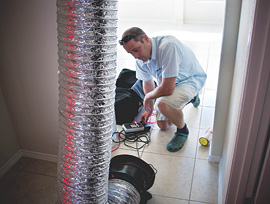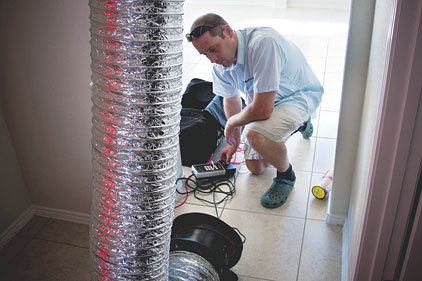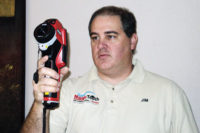
|
| A BPI-certified professional performs a duct leakage test. |
Why? Well, according to industry experts, HVAC contractors have an easy “in” to home performance. And that’s because they’re already invited in by the homeowner whenever there’s an IAQ or comfort concern.
“HVAC contractors get into more homes than almost any other profession,” said Michelle Knaszak, vice president, GreenHomes America, Irvine, Calif. “They’re already dealing with comfort and energy savings on a daily basis. Being able to offer home performance in addition to their current HVAC business — it’s a win-win situation for the customer and the HVAC contractor.”
According to Michael Rogers, president, OmStout Consulting, home-performance contractors with HVAC in-house will ultimately dominate this market.
“One key reason for this is the large, active customer base,” Rogers said. “That said, the HVAC industry has been very slow on the uptake. I’ve seen some start-ups encroach and take market share from old HVAC businesses that aren’t adapting. And I’m seeing existing early-HP-adopting HVAC contractors grab market share from their HVAC competitors, growing significantly over the past five years, while others were downsizing.”
From his vantage point as a performance success coach at Comfort Institute Inc., Michael Goater is now seeing more HVAC contractors expanding into home performance.
“A couple of years ago, the insulation companies and home auditing companies were filling this niche,” he said. “Today, however, HVAC contractors are seeing the potential of HPC, understanding what it really means to their businesses, and seeing codes change across the country that include HP testing when replacing equipment and/or ductwork, so they are getting involved at increased levels.”
Accreditation and Training
But getting involved in this market requires a different mindset, and that means contractors must learn to think beyond the box they’re used to focusing on. While HVAC contractors have traditionally focused on the box — whether a furnace or air conditioner — their focus has to broaden to consider how the whole home is functioning.
Paul Stalknecht, president and CEO, Air Conditioning Contractors of America (ACCA), described all of the aspects that this broader approach must take into consideration. He said the whole building includes the shell (e.g., roofing, doors, windows, etc.), envelope integrity (e.g., insulation and air tightness), moisture control (e.g., bulk water control, leak prevention, humidity management), as well as efficient operation of the mechanical systems (e.g., HVAC systems, hot water systems, ventilation equipment).
That’s a lot of pieces to pay attention to, and it takes education and training to move into this market. Because of this, industry experts recommend that contractors seek accreditation with an organization that offers a nationally recognized home-performance program.
According to Leslie McDowell, Building Performance Institute Inc.’s (BPI) director of marketing and communications, “BPI offers certification of individuals in residential building energy auditing and analysis; heating, a/c, heat pump, and envelope performance; insulation/air leakage control installation; manufactured housing; and multifamily designations.”
The certification process includes an online exam and practical field exam. While no training is required before individuals take a BPI certification exam, it is recommended.
“Both classroom theory and hands-on field training are provided by a nationwide network of more than 200 independent training organizations, including private companies, community colleges, and local nonprofit agencies,” McDowell explained.
Another offering that BPI has rolled out is an entry-level Building Science Principles (BSP) Certificate of Knowledge.
According to McDowell, this certificate is intended “for those in the residential building trades who need to learn how homes work, but don’t need the hands-on technical skills required of BPI-certified professionals.”
Going beyond the individual level, McDowell noted, contracting companies seeking to attain BPI accreditation must “meet rigorous eligibility criteria and participate in BPI’s Quality Assurance Program.”
According to Stalknecht, ACCA will launch a new Home-Performance Contractor (HPC) accreditation program at the association’s upcoming conference, March 17-20, 2014, in Nashville, Tenn.
“The contractors who are already involved in our Residential Service and Installation (RSI) accreditation program, serving the existing homes market, will need to take a training course and pass a test before entry into the Home-Performance Contractors program,” Stalknecht explained. “Others will need to apply for RSI accreditation in addition to satisfying the ACCA Home-Performance accreditation criteria.”
This program will require contractors to complete a multi-session online training program on the basics of home performance and an exam to demonstrate a level of competence in this field.
But it doesn’t end with the certificate or the credential, Rogers noted. “Certification is just the beginning,” he said. “A robust, in-house training program is important to ensure success, especially as you grow.”
Government Incentives
As the home-performance market has grown, it has often been fueled by government involvement at varying levels. This can be a boon to HVAC contractors entering this market — but it can also lead to a bust.
According to Stalknecht, “The HPC market relies on a certain level of incentive from the government, whether it be a federal, state, local, or utility-sponsored incentive program. All are designed to help the consumer get over the initial first costs of a variety of comprehensive and coordinated improvements that can reduce energy use and save on utility bills. Probably the best known program is Home Performance with Energy Star, with nearly 2,000 contractors participating nationwide.”
On the federal level, he said, “The Department of Energy is working to boost the home-performance contracting industry with employee training and certification, funding to support incentive programs, and increasing awareness of energy use through audits.”
Meanwhile, on the state level, Stalknecht pointed out that the online Database of State Incentives for Renewables & Efficiency (DSIRE) lists 49 states with HPC rules, regulations, or policies in place.
And, he noted, “Forty-five states offer incentives for such improvements, ranging from a rebate/financial incentive, on-bill financing, PACE/loan program, and expedited permitting, to tax credit/abatement.”
“New grants, incentives, and low-interest energy loans are popping up across the nation,” said Knaszak. “This may help in some areas to get the homeowner an additional incentive to perform the work. But incentives are not necessary for the home-performance industry to flourish.”
Plus, she said, “Sometimes it could be detrimental to have a program start and then lose the funding after a short period of time.”
According to McDowell, there are other instances where the government can hurt more than help.
“The biggest regulatory issue affecting the emerging home-performance contracting industry is the manner in which state regulatory entities determine the cost-effectiveness of individual home-performance improvement measures,” she said. “Measure-by-measure cost-effectiveness tests limit the ability of the home-performance contracting industry to deliver whole-house contracting solutions for customers.”
Looking ahead, Goater said: “What I think you will see in the immediate future is even more states and townships enforcing the most current codes that require HP testing and verification. I believe you will also see tax credits in the very near future that promote HPC and require test-in, test-out procedures.”
But overall, Goater said that it’s better to be ahead of the government. “Those contractors who are adapting early are doing very well and offering something most of their competitors aren’t capable of. This gives them a huge advantage in their marketplace. But, there are some companies out there that will always wait for their local utility company, their local codes, or the federal government to force them into HPC through rebates, incentives, and tax credits,” he said. “The best contractors out there are getting involved and capitalizing on the opportunities while protecting their customer base.”
On the Horizon
What’s ahead? According to industry experts, the market and technology for achieving higher home performance will continue to evolve.
“There is a need to stay on top of the constantly evolving technology across the board — whether we’re talking about spray foams, exterior insulation retrofit practices, improving heat pump technology, or smart windows,” Rogers said. “I think smart contractors will also be keeping an eye on the nexus of energy efficiency, renewables such as solar and micro wind, and energy storage, especially if electric vehicles continue to make inroads into the market. That’s really looking at the house as a system — not just for shelter, but for living.”
Pointing to a particular aspect of the technology, McDowell said: “Many BPI-certified professionals already use energy auditing software to model predicted energy savings in the home. As these software systems become more comprehensive and accurate, understanding how to use these tools effectively will become increasingly important, to develop easily understood scopes of work for customers.”
Education will be key for contractors, Stalknecht said.
“As with all emerging and growing market segments, contractors need to continue to seek out training and continuing education to stay ahead of the curve,” he said.
And to top it all off, as awareness of home performance improves, contractors will need to be prepared to meet evolving customer expectations. “Contractors will need to learn that consumers are becoming better educated,” Knaszak said. “Customers will now ask for an energy audit prior to signing any contract. Contractors have to be prepared.”
Publication date: 10/7/2013






Report Abusive Comment